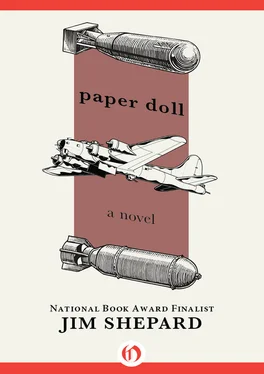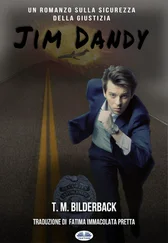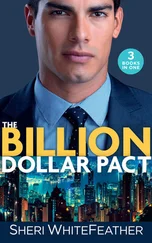They went back to the waist and hefted Snowberry. His head thumped and bobbed against Bryant’s chest and they had an impossible time on the narrow catwalk, tipping this way and that, catching limbs. Bryant’s arm was open again and streaming blood and he was faint. They managed to lay Snowberry down beside the dorsal turret and Bryant’s flight engineer’s panel. There was nothing to wedge him in with. Bryant leaned into the cockpit and saw above and beside them two Spitfires, watching them lose altitude, trying by example to nurse them back.
Bean stayed with Snowberry, wedging himself in to cushion the blow for his friend. Bryant assumed Cooper’s seat when the steering columns began to shake, the great posts with their horseshoe wheels impossible for Gabriel to control alone anymore as the last of the hydraulics went and Paper Doll dipped lower, and lower, and the gray and rough waves loomed up like harsh and jagged pavement, and Gabriel wrapped an arm around the column, trying to bring them in along the troughs of these waves, trying to keep their nose up. And Bryant held on and mimicked his pilot and fought what was out of control, wanting despite everything to believe the nose would stay up and the fuselage would hold together, wanting to believe in Air Sea Rescue and the Spitfires’ silent assurance, wanting to believe that Hirsch had jumped, that Eddy had survived, that Snowberry hadn’t suffered so; wanting to believe even then in their ability to deal with the uprushing stone ocean, rising now in all its detail, filling his field of view.
Most of this novel is based on verifiable fact. The characters in it are mine. Though care has been taken not to contradict historical testimony, I have not hesitated to invent whenever it seemed fictionally right to do so. While the overall situations and missions are as accurate as I could make them, Paper Doll and its fate remain wholly my invention.
I gratefully acknowledge my debt to the many people I’ve interviewed and the many texts I’ve consulted. I thank Joe Kusy, Lieutenant Colonel Juliann L. Kelly, U.S.A.F., Ken Kelly, Donald Lopez, Robert McIntosh, Colonel Richard Williamson and the staff of the 512th Antique Aircraft Restoration Group, Dover Air Force Base, Peter Chandler, Catherine Shine, Lenny Simon, Don McWilliams, Joe McCullough, Major Jim McGuire, Louis Kelley, and William Walton. Special thanks are due Albert Shepard and Betty Kelley, both of whom contributed far above and beyond the call of duty.
Besides original newspaper sources, I’ve made extensive use of information from The Army Air Forces in World War II , edited by W. F. Craven and J. L. Cate; The Mighty Eighth , by Roger Freeman; One Last Look , by Philip Kaplan and Rex Alan Smith; The Pilot’s Manual for the B-17 Flying Fortress; B-17 Parts Catalog for Type A-1B Turret; Ploesti , by James Dugan and Carroll Stewart; The Schweinfurt-Regensburg Mission , by Martin Middlebrook; The Fall of the Fortresses , by Elmer Bendiner; Piece of Cake , by Derek Robinson; Decision over Schweinfurt , by Thomas Coffey; The Good War , by Studs Terkel; Air Force Diary , edited by James Straubel; Impact: The Army Air Forces Confidential Picture History of World War II ; and Air Force Combat Units of World War II , by the U.S.A.F. Historical Division.
Jim Shepard (b. 1956) is the author of four short story collections and seven novels, most recently The Book of Aron , which has been shortlisted for both the Kirkus Prize and the American Library Association Andrew Carnegie Medal. Originally from Connecticut, Shepard now lives in Williamstown, Massachusetts. He is the J. Leland Miller Professor of English at Williams College, where he teaches creative writing and film. He won the Story Prize for his collection Like You’d Understand, Anyway , which was also a finalist for the National Book Award. Shepard’s stories have appeared in the New Yorker , the Paris Review , the Atlantic Monthly, Harper’s Magazine , and McSweeney’s Quarterly Concern , among other publications; five have been selected for the Best American Short Stories , two for the PEN/O. Henry Prize Stories , and one for a Pushcart Prize.












